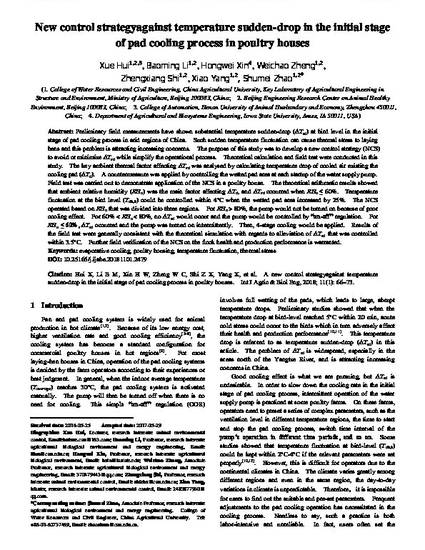
Preliminary field measurements have shown substantial temperature sudden-drop (ΔTsd) at bird level in the initial stage of pad cooling process in arid regions of China. Such sudden temperature fluctuation can cause thermal stress to laying hens and this problem is attracting increasing concerns. The purpose of this study was to develop a new control strategy (NCS) to avoid or minimize ΔTsd while simplify the operational process. Theoretical calculation and field test were conducted in this study. The key ambient thermal factor affecting ΔTsd was analysed by calculating temperature drop of cooled air existing the cooling pad (ΔTd). A countermeasure was applied by controlling the wetted pad area at each startup of the water supply pump. Field test was carried out to demonstrate application of the NCS in a poultry house. The theoretical arithmetic results showed that ambient relative humidity (RHo) was the main factor affecting ΔTd, and ΔTsd occurred when RHo ≤ 60%. Temperature fluctuation at the bird level (Tdb,b) could be controlled within 4°C when the wetted pad area increased by 25%. The NCS operated based on RHo that was divided into three regions. For RHo > 80%, the pump would not be turned on because of poor cooling effect. For 60% < RHo < 80%, no ΔTsd would occur and the pump would be controlled by “on-off” regulation. For RHo ≤ 60%, ΔTsd occurred and the pump was turned on intermittently. Then, 4-stage cooling would be applied. Results of the field test were generally consistent with the theoretical simulation with regards to alleviation of ΔTsd that was controlled within 3.5°C. Further field verification of the NCS on the flock health and production performance is warranted.
Available at: http://works.bepress.com/hongwei_xin/331/

This article is published as Hui, Xue, Baoming Li, Hongwei Xin, Weichao Zheng, Zhengxiang Shi, Xiao Yang, and Shumei Zhao. "New control strategy against temperature sudden-drop in the initial stage of pad cooling process in poultry houses." International Journal of Agricultural and Biological Engineering 11, no. 1 (2018): 66-73. doi: 10.25165/j.ijabe.20181101.2479. Posted with permission.